Three Chester men will learn in months if they are granted new trials. Their families are used to waiting.
A judge will decide whether new DNA evidence exonerates Samuel Grasty, Derrick Chappell, and Morton Johnson for a 1997 murder.

It’s been more than 20 years since Mahir Sharif has seen his cousin Samuel Grasty outside of a prison cell or courtroom.
Grasty and two other Chester men are engaged in a lengthy push to vacate their convictions for the 1997 murder of 70-year-old Henrietta Nickens — a crime that their lawyers argue new DNA evidence should exonerate them from.
Sharif, 53, and other family members get emotional whenever Grasty is ferried into Delaware County’s Court of Common Pleas alongside Derrick Chappell and Morton Johnson, the two other members of the trio who were tried and essentially given life sentences for Nickens death when they were teenagers.
“It’s been a long agonizing process,” Sharif said. “From the beginning we always said that they were innocent. We tried to do everything we could to prove that. It’s hurtful — our family’s been hurting for years.”
Sharif and his family were in attendance Tuesday in Judge Mary Alice Brennan’s courtroom, where Grasty, 46; Chappell, 41; and Johnson, 42; appeared for the final hearing in their post-conviction relief motion, an appeals process that began nearly a decade ago when lawyers took on their case pro bono.
Grasty flashed a grin to his family as sheriff’s officers ushered him in, a brief moment of connection before he took his seat at the front of the courtroom.
Lawyers for the three men are asking for the murder convictions to be vacated and for each man to be granted a new trial with the new DNA evidence.
That evidence, they argue, points to Nickens being raped and physically assaulted by a single, unknown perpetrator — and could have helped inform juries that convicted the men in the 2000s, had the evidence been available.
Tuesday’s hearing rehashed many of the points made in a July hearing, one where forensic crime scene expert Timothy Palmbach hadn’t been available to testify.
On the stand Tuesday, Palmbach rebutted the prosecution’s contention that Nickens had consensual sex hours before her assault or had been raped after she died. Prosecutors have offered those explanations for the semen recovered from her body — which did not match the DNA of Chappell, Grasty, or Johnson — while the defense contends it belongs to the true, unknown killer.
By midafternoon, arguments came to a close. But instead of receiving the ruling he’s waited years to hear, Sharif learned that he’ll be waiting at least three months before Brennan will make a decision on his cousin’s case.
What happens in post-conviction relief cases
That pace is typically how post-conviction relief rulings unfold, according to Philadelphia lawyer John M. Lyons, who took Chappell’s case eight years ago in partnership with the Pennsylvania Innocence Project (the nationally focused Innocence Project took Johnson’s and the New Jersey-based group Centurion took Grasty’s).
Lyons and his partner, David Haase, said that now the defense and prosecution have 60 days to review the hearing’s transcripts and submit documents outlining their arguments for disputed points. They are then given an additional 30 days to rebut the opposing side’s contentions.
Brennan has the ultimate authority to either deny the men’s appeals or grant them new trials before juries. However, according to Lyons, the latter scenario would raise the possibility that the defendants won’t have to continue their legal fight.
“There have been cases in Philadelphia and elsewhere when the court says it’s granting a new trial, and the district attorney says it doesn’t make sense to retry this,” Lyons said. He believes the DNA evidence makes it questionable whether prosecutors would retry Grasty, Chappell, and Johnson.
Paul Casteleiro, who represents Grasty with Centurion, said Brennan could deliver her decision any time after the 90-day period is up.
Like Sharif, he’s hoping for a swift decision.
“In the next 90 days, all we can do is pray to God,” Sharif said. “We hope the outcome is beneficial to our family, meaning that they’re exonerated immediately, without having to go to another trial and going through more agonizing pain.”